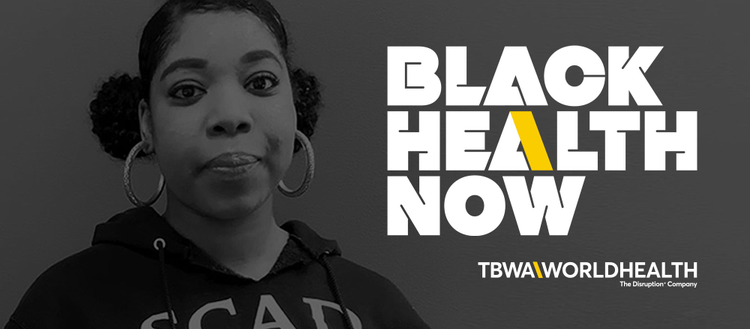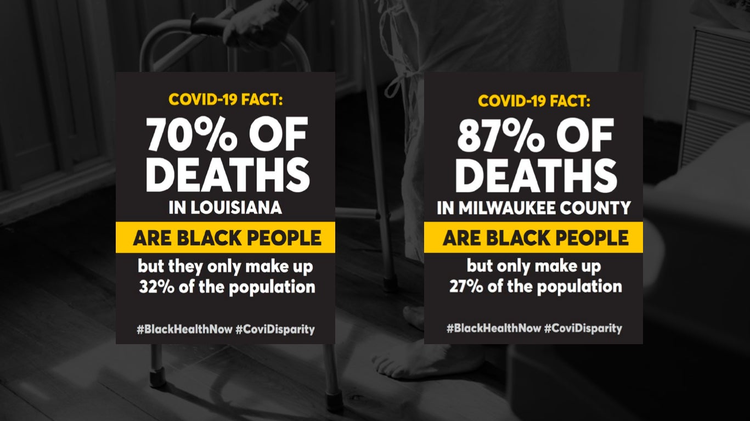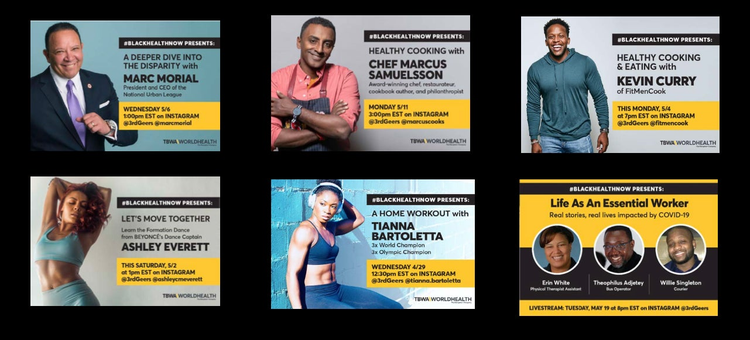#BlackHealthNow raises awareness of health inequality and drives action

If Black and white people had the same mortality rate in the United States, 100,000 fewer Black Americans would die each year. Black Americans, on average, live three years less than white Americans with the same income. Black Americans have higher rates of obesity, diabetes, heart disease, hypertension and asthma, and at the same time, are less likely to survive curable cancers and find empathetic care. The numbers don’t lie — and they demand action.
To help raise awareness of — and close — these massive health disparities, global healthcare communications agency TBWA\WorldHealth launched #BlackHealthNow at the beginning of 2020 (before the COVID-19 pandemic began). The multi-layered initiative kicked off during Black History Month with a call-out to Black agency staff, encouraging them to share their experiences of medical bias for a digital campaign. The hope was to move the dial on this crucial issue — little did the #BlackHealthNow team know their work would become more important than ever before.
“We wanted to mobilize employees and colleagues within our organization to speak out,” recalls Wallye Holloway, associate managing partner at TBWA\WorldHealth. “We wanted them to share their personal stories, and much to our surprise a lot of people started contributing, even people from outside of our organization but within our holding company network. It raised awareness of the issue, in a way that only a nimble, digital campaign could, and demonstrated that these issues weren’t restricted to marginalized communities or disadvantaged sectors of the Black community.”
To get the word out, the team interviewed their colleagues on camera, new videos were released throughout February, covering topics such as heart disease, pregnancy complications, biased treatment algorithms, and more. The series was posted across all the major social media platforms, accompanied with the hashtag #BlackHealthNow and a call-to-action for readers to share their own stories. To drive action, the team also compiled a comprehensive list of questions that every Black American should take to their medical appointments.
Bianca Williams, an art director at TBWA\WorldHealth, talks about what led to the death of her grandmother from heart failure
Amid the campaign, which was picking up momentum, the COVID-19 pandemic hit. It quickly became apparent that the Black population in the US was disproportionately affected, and #BlackHealthNow took on an even greater level of importance.
Black health during COVID-19
With the onslaught of COVID-19 came another round of troubling health data: Black people were becoming ill and dying at higher rates than white people. Black people were less likely to receive a test for COVID-19 than white people and testing sites in some states were being set up in more areas with a predominantly white demographic. All the talking points of the #BlackHealthNow campaign had suddenly shown up in real-time.
“We knew #BlackHealthNow had to have a voice in this,” Holloway explains. “We owed it to the little audience that we’d started to build. Together with the social justice movement that happened at the same time, it created a bellwether for people to lean in on the topic and look at it through the lens of healthcare disparity.”
“We talked about all the ways that we, as a health company, could help,” adds Bryan Gaffin, executive creative director at TBWA\Worldhealth. “We knew what people were faced with. They lived with several generations in one home, they couldn’t exercise enough, or their food supply was limited because they couldn’t go to the market. We had a lot of stats and facts but, on their own, these generally don’t move people. You have to have somebody who tells the story, then you start to see people’s eyes opening up.” #BlackHealthNow set out to tell those stories and respond to the public health emergency that was becoming more daunting by the day. Due to the COVID-19 pandemic, they knew they had to use every digital tool available to reach people as they sheltered in place, at home.
The team decided to pivot their passion project — the goal became to educate Black Americans with reliable information about the crisis but also to provide simple, actionable tips they could use to protect themselves from getting COVID-19, stay healthy, and learn new skills to deal with a biased healthcare system. This presented a chance to create change within the medical community, too, by working closely with them.

Creating a cross-platform video and social media campaign
The #BlackHealthNow team turned their attention from videos to a series of livestreams, which they continue to run to this day. They regularly interview medical professionals on the front lines of the fight against COVID-19 (along with political leaders and celebrities) to bust myths and share advice about how to avoid getting sick.
Speed was paramount to maximizing the success of the #BlackHealthNow campaign and achieving the most common good in the early days of the pandemic. As everyone found themselves in quarantine suddenly, remote collaborative work sessions were essential. The team used Adobe Creative Cloud tools and Creative Cloud Libraries to create and share assets to ensure people could get on board quickly.
To cut through the noise of social media, the campaign also needed a strong design element. “How we present the campaign is paramount,” Gaffin explains. “We designed a logo for #BlackHealthNow, based on our corporate black and yellow look, which really makes it stick out.
The #BlackHealthNow livestreams are now being broadcast across multiple platforms to ensure they reach as many people as possible. Celebrities tend to use Instagram Live, which brings their followers to the campaign, while medical and political experts favor Zoom and YouTube, which also enables the team to create enduring content.
Bringing experts straight to the community
People from high-profile advocacy organizations and TBWA\WorldHealth’s network are now lining up to suggest topics they want to talk about, such as hypertension, diabetes, and obesity — all underlying health conditions that are more prevalent in Black people, which could lead to higher death rates from COVID-19. There is another key part of the strategy, too: purposefully not involving clients in the campaign, such as pharmaceutical companies.
“There’s a level of credibility that comes from who you partner with,” Gaffin points out. “The American Health and Diabetes Associations are agnostic to treatments but if you worked with a specific pharma company, it might skew how it’s seen.”

The #BlackHealthNow livestreams address COVID-19, diet, and exercise, as well as actionable ways to fight the racial disparity in healthcare.
If you’re looking for proof of the campaign’s success so far, look no further than the metrics: #BlackHealthNow has seen more than 50,000 live viewers on Instagram, over 35,000 video views on LinkedIn, and over 2.1 million impressions on Twitter.
The industry is also starting to notice and take key steps on this important issue. Trade group Pharmaceutical Research and Manufacturers of America (PhRMA), for example, issued an open letter, committing to enhance its engagement with Black and Brown communities and to do its part in advancing racial equity.
The future of the campaign is determined by its audience, which continues to grow. The team is constantly welcoming more partners and experts to join the livestreams, with the goal of getting an even wider demographic involved, beyond the Black communities. More resources and tools to help people take action will be added, too — to even further amplify the efforts of the #BlackHealthNow team and truly drive change in this huge public health challenge. It’s truly become a powerful digital tool in the fight to close the health care gap.
“Someone told me that they’re not going to send Christmas cards this year,” Holloway reveals. “They’re going to send the #BlackHealthNow link about managing cardiovascular disease to their loved ones so they can learn from it. It’s amazing to see how it’s enlightening people.”
For more on #BlackHealthNow, check out the campaign on Instagram, YouTube, Twitter, Facebook, and LinkedIn. New livestreams are added frequently, and you can watch prior events on-demand.